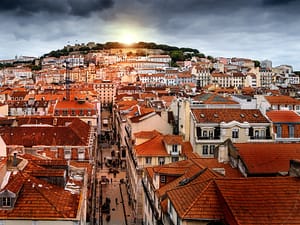Plenty of restaurants serve the usual fish and shellfish, and many erstwhile Portuguese colonials from Brazil, and even Mozambique and Goa, have opened restaurants in the capital. The menus in the top establishments remain on par with those of Europe’s leading restaurants. In Lisbon, you’ll encounter the best of Portuguese cooking mixed with Continental classics.
You needn’t pay exorbitant prices for top-quality food, though. Restaurants featuring Portuguese and foreign fare — from beer-and-steak taverns to formal town-house dining rooms to cliffside restaurants with panoramic views — suit all budgets. For the best value, look for the “tourist,” or fixed-price menu, which usually includes two or three courses, and sometimes wine, for far less than ordering a la carte. You might also want to consider an evening meal at a fado cafe. Lisboans tend to eat much later than most American, Canadian, and British visitors, although not as late as their Spanish neighbors. Some restaurants (including Gambrinus, Bachus, and Cervejaria Trindade) stay open very late.
Lisbon has many “green lungs” (public parks) where you can go with picnic fixings. Of these, the most appealing is the Jardim Botânico, Rua da Alegria, with its ornate iron benches and shrubs and trees from all parts of the world. Portugal has some great wines, and most visitors to Portugal are relatively unfamiliar with Portuguese wine. There are many wine regions and styles, but look out for vinho verde (a sparkling white wine), as well as reds from the Douro and Alentejo. Ginjinha is a sweet cherry liqueur that’s typical to Lisbon, and it’s definitely worth trying it while you’re here. Port is obviously more typical to Porto, but that doesn’t mean you can’t try it in Lisbon. You’ll find it in the supermarkets and garrafeiras (wine shops), and you’ll also be able to get it in most bars and restaurants as well. Portugal’s two main beers are Super Bock and Sagres, and Sagres tends to be more typical in Lisbon. There’s also a growing craft beer scene in Portugal, and there are a growing number of Portuguese producers.

